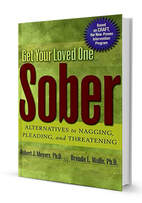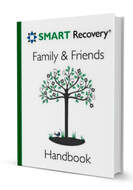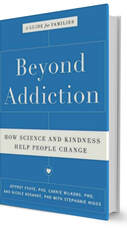Family Resources
This resource page can be a beacon of hope, a source of information, and a bridge to vital services for those grappling with the challenges of addiction and behavioral health challenges.
What is addiction?
|
Addiction, properly understood, is neither a disease to be cured—though it has aspects of a disease—nor a problem to be eliminated. On the contrary, addiction is the individual’s attempt to solve a quandary. Before we can address addiction, this simple fact must be understood.
What is the problem that addiction is meant to resolve? As the Rolling Stones guitarist Keith Richards wrote about his own heroin habit, it can be a search for oblivion. He writes of “the contortions we go through just not to be ourselves for a few hours.” Why would a person long to escape themselves? Because, as a result of their life experiences, they are intensely distressed and may feel trapped within their situation. To put it another way, all the addictive substances (and addictive behaviors) soothe pain or at least distract from pain. Specifically, abusive substances like opiates are powerful painkillers, both physical and emotional; as is cocaine; as is alcohol. Hence, the question is not why the addiction, but why the pain? And, again, the answer resides neither in genes nor in “choices,” but in the lives and experiences of the individual. Source: Compassion4Addiction |
The Myth of Normal by Gabor Mate
A New Approach
|
A Biopsychosocial Approach to Understand Addiction
Humans are social creatures. A biopsychosocial model incorporates the scientific understanding that the biology of human beings, including their brain biology, is from conception until death is in profound interaction with and is shaped by their relationships with other people and by their own emotional states. In real life the physiology of people cannot be separated from their minds. As the psychiatrist Thomas Hora said, “When we get the what, we know the how.” Before we ask what to do about addiction, we have to define our perspective. What we do about any phenomenon depends on our understanding of it. The available information about addiction is inadequate, hence the high failure rate of programs. The mainstream view of addiction (as compared with the medical view) is that addiction is a matter of individual choice, moral failure, or weakness. Thus exist the approaches aimed at deterrence or punishment. The medical view is that addiction is a disease of the brain, with disordered brain circuits and disordered behaviors. This view is both accurate, so far as it goes, and hopelessly narrow. It is accurate because the addicted brain is demonstrably a physiologically dysfunctional brain, but narrow because it seeks to explain the dysfunction in strictly physiological and biochemical terms, without recognizing the emotional and social inputs into how the brain operates. (See biopsychosocial above.) Different as they are, these two views share a lack of understanding that addiction is a product of and a response to life experience; in fact, it’s neither a conscious choice nor an inherited illness. Addiction is a complex issue and to make progress, it gets to be addressed from several angles. Source: Compassion4Addiction |
What is Addiction? by Gabor Mate
Treatment of Addiction
|
Treatment gets to begin with an acknowledgment of the fundamental problem the addiction is attempting to resolve in the person’s life. In other words, what gets to be explored is not what’s wrong with the addiction, but what is “right” about it. People experiencing addiction already know that their habits are body and soul-annihilating, not to mention socially nihilistic. They require validation, not for the way the addiction wants to meet these needs, but for the fundamental needs themselves.
Of course, the needs of someone experiencing addiction are the same as what all humans need: self-acceptance, relief of pain, peace of mind, social connection, and a sense of power and place. Treatment, thus, gets to explore how, in a person’s life, these needs were not fulfilled; why that person developed the belief that only through particular substances or behaviors would they be met: or what, in other words, created the susceptibility. Here we get to recognize that no substance in itself or by itself is addictive: most people can use most “addictive” substances (e.g., alcohol or opiates for pain relief), even repeatedly, without becoming addicted to them. The next question is: how do we help people legitimize their needs without having to resort to self-harming and self-defeating habits. The treatment of addiction gets to be devoid of moral judgments, blame, and ostracizing—either of the person experiencing addiction or their family members, or of their addictive behaviors. As the spiritual master A.H. Almaas writes, “Only when compassion is present will people allow themselves to see the truth.” Source: Compassion4Addiction |
Dr. Gabor Mate on Attachment and Conscious Parenting
The Journey of the Heroic Parent
More Family Addiction Recovery Resources
|
If you think you or someone you love may have suffered from toxic stress as a child, it is important to seek out qualified trauma-informed-care professionals. Here is an initial list of treatments among other modalities that we have researched to be extremely healing for trauma.
|
Recommended Reading

Get Your Loved One Sober: Alternatives to Nagging, Pleading, and ThreateningGet Your Loved One Sober offers a revolutionary program for those who are seeking recovery for a loved one. CRAFT has been found to be twice as effective as Johnson Interventions in getting a loved one into treatment.

Family & Friends Handbook
Designed for people affected by the addictive behavior of a loved one, this 138-page Handbook can be used in conjunction with attendance at SMART Family & Friends online or local community meetings, or on its own.
Designed for people affected by the addictive behavior of a loved one, this 138-page Handbook can be used in conjunction with attendance at SMART Family & Friends online or local community meetings, or on its own.

Beyond Addiction: How Science & Kindness Help People ChangeBased on CRAFT, this book from the Center for Motivation and Change offers a groundbreaking, science-based guide to helping loved ones overcome addiction problems and compulsive behaviors.
NOTE: There is no quick fix to maintaining any kind of behavior change; skills, practice, and supports are needed for the long haul.
Family Coaching Services
From Start to Flourish
Contact Timothy Harrington
Telephone: 323-804-5555
From Start to Flourish
Contact Timothy Harrington
Telephone: 323-804-5555
Medical Disclaimer: The information available from this website has been prepared and/or obtained for general information, education, reference, and/or entertainment purposes only and is not intended to provide medical advice. The owner of this website is not a licensed doctor and is not providing medical advice, or diagnosing or treating any condition you may have. We are not your doctor. You agree that you will not act upon anything contained in this website without first seeking professional medical advice.


